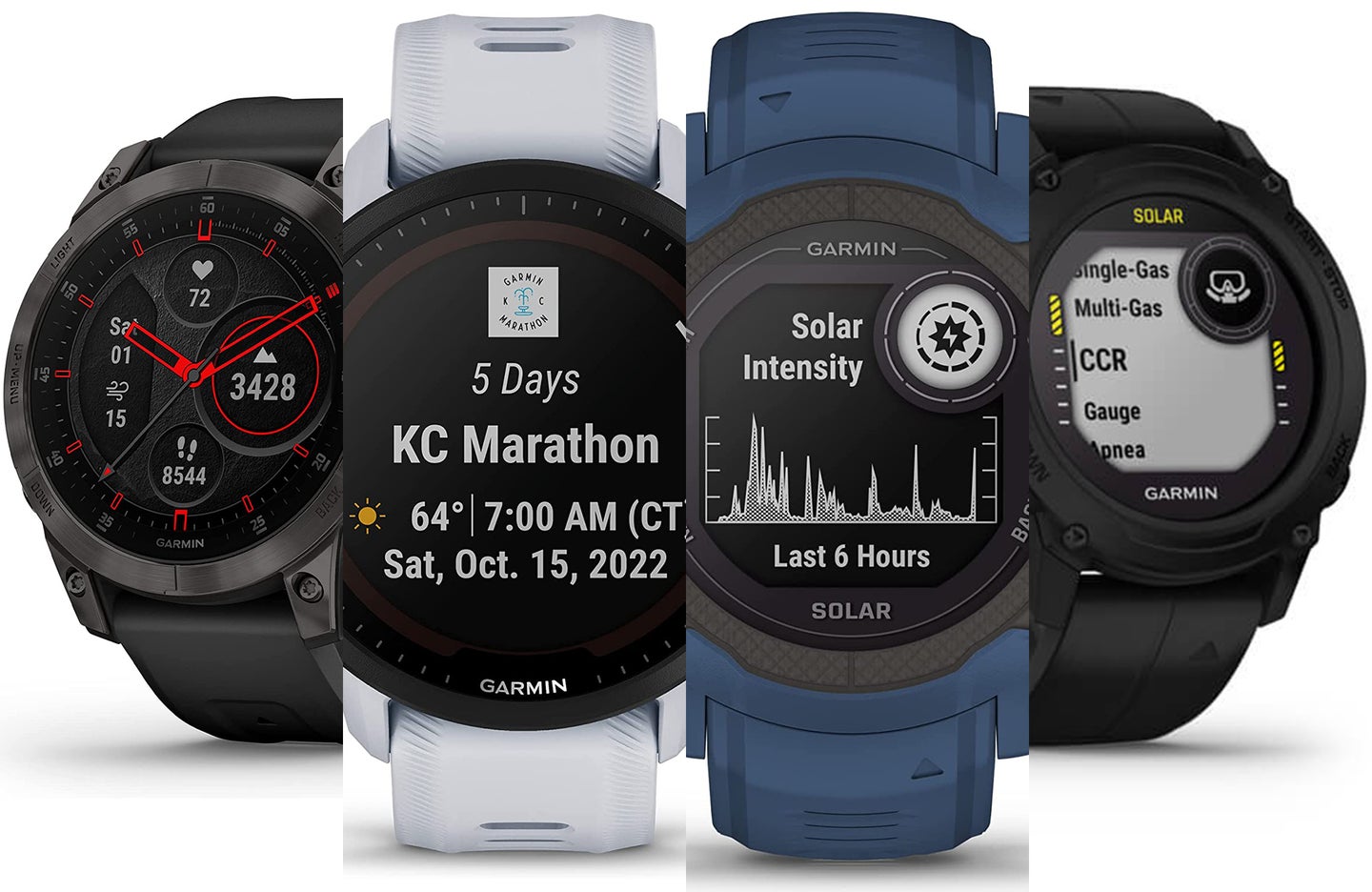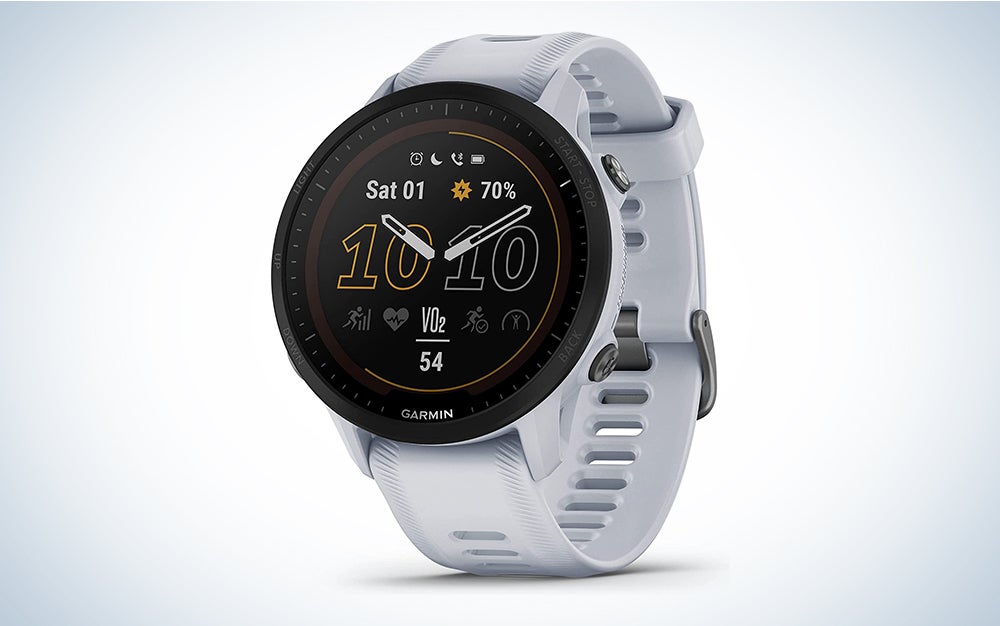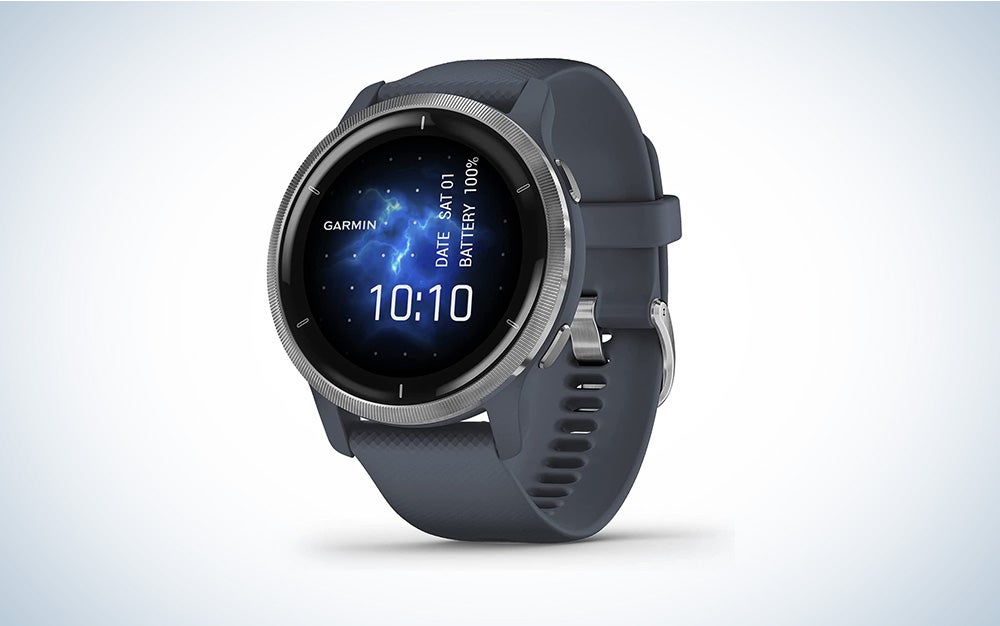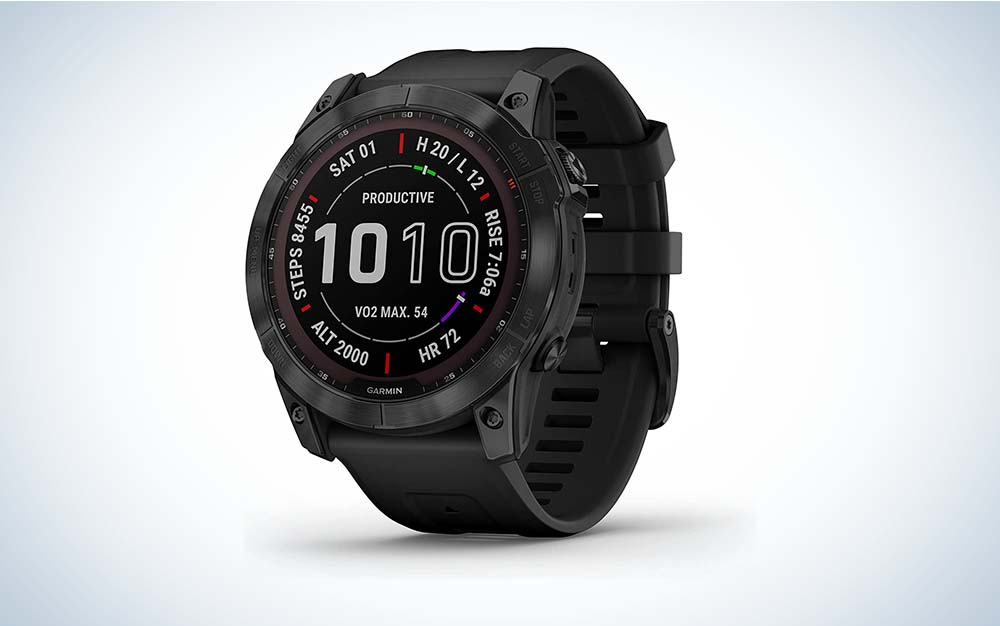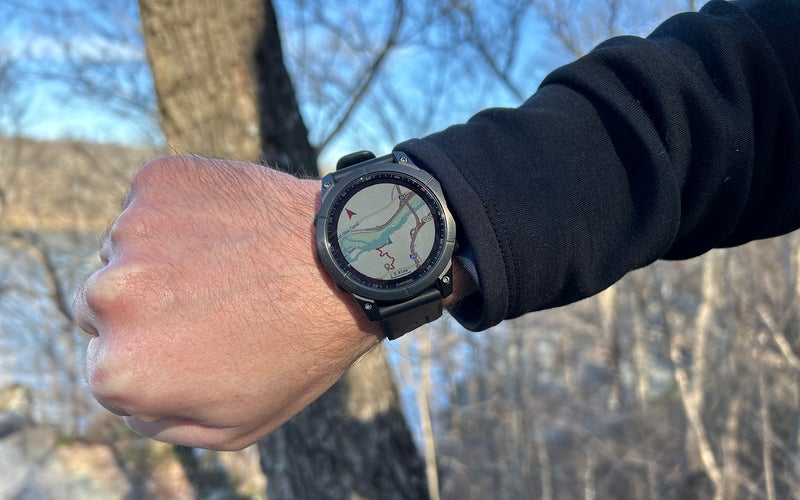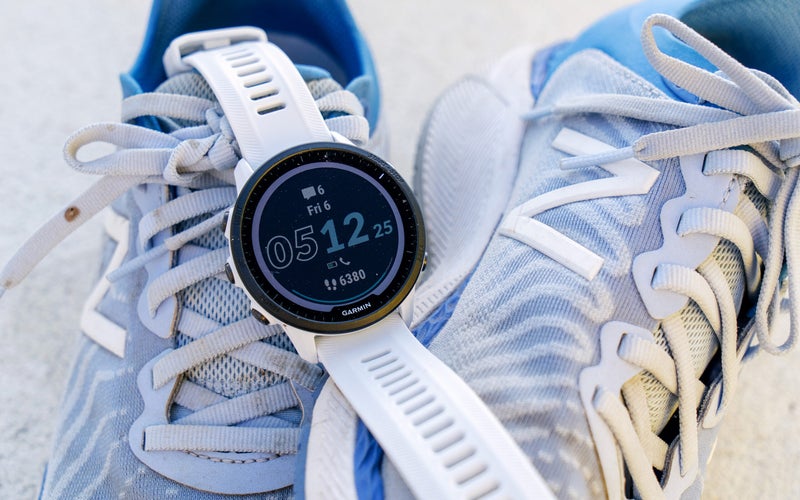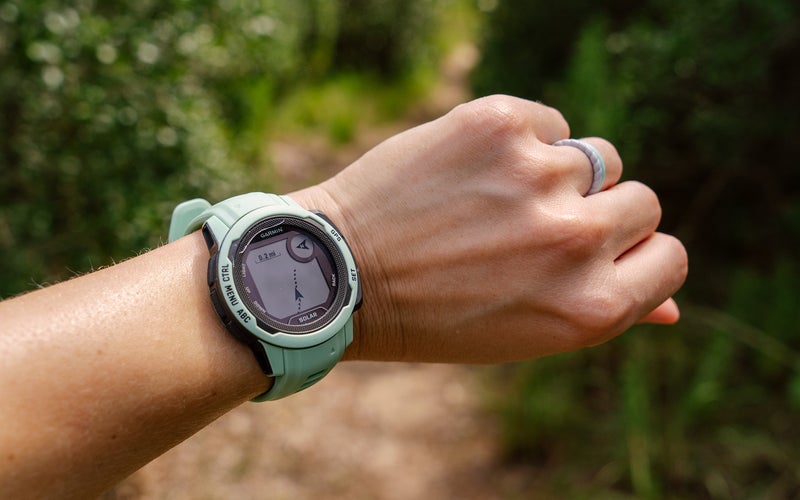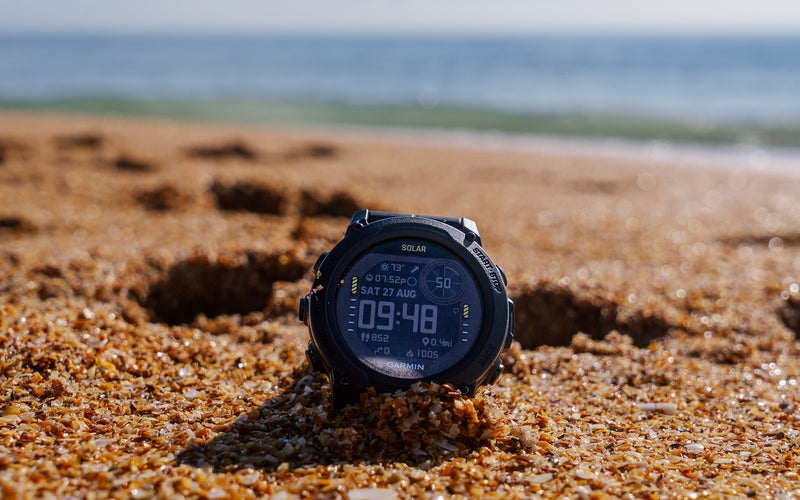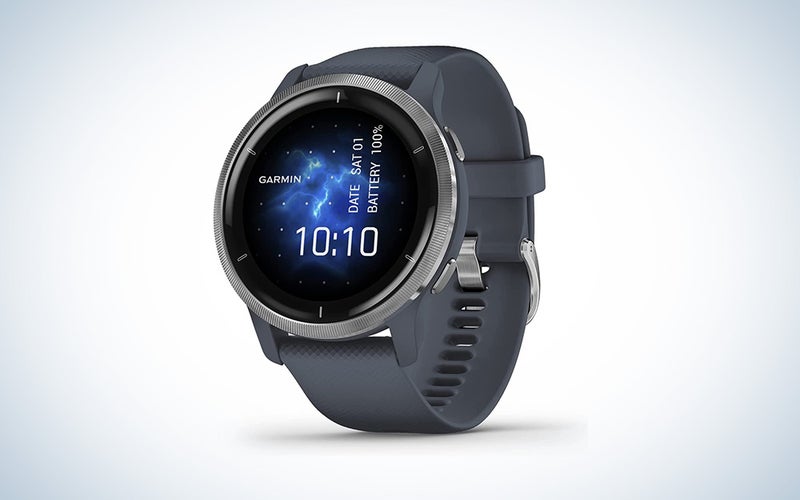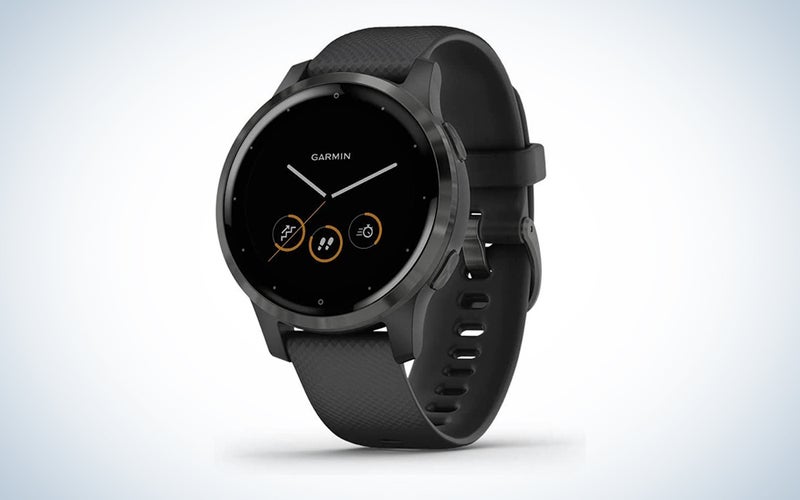We may earn revenue from the products available on this page and participate in affiliate programs. Learn more ›
Garmin is one of the most popular smartwatch makers in the world, largely due to the multinational GPS-enabled technology company’s focus on hyper-accurate fitness tracking. While Apple still holds 30% of the global market (and over 50% of its revenue), according to a February 2023 Counterpoint Research report, Garmin has achieved a position of prominence on people’s wrists from the boardroom to the backcountry. When it comes to premium multisport wearables, Garmin is the endurance athlete’s top choice because of the depth of activities supported and battery life that can outlast almost any adventure. We’ve pulled together several of the company’s most popular products to help you find the best Garmin smartwatch to fit your lifestyle, sense of style, and budget.
- Best overall: Garmin fēnix 7 Sapphire Solar and Garmin epix (Gen. 2)
- Best running watch: Garmin Forerunner 955 Solar
- Best for hiking: Garmin Instinct Solar 2
- Best for diving: Garmin Descent G1 Solar
- Best fashion wearable: Garmin Venu 2
- Best budget watch for beginners: Garmin Vivoactive 4
How we chose the best Garmin smartwatches
All Garmin smartwatches provide a degree of wellness metering; they measure steps, monitor your heart rate, and generally check to make sure you’re still alive. But if you take your training seriously, the best smartwatches feature activity tracking, pulse oximeters to measure the oxygen in your blood, stress metering, energy-level monitoring, sleep trackers, customizable training regiments, and challenges designed to help you improve in your favorite sports. The Garmin Connect app syncs to your iOS and Android phones, providing access to customizable coaching and a community of athletes to compete with. If you’re serious about training, durability should also trump style. You don’t want it falling apart the first time you bang the watch against a machine at the gym, or you take a hit on the playing field. And if you’re a swimmer, your watch has to be waterproof, too. We took all these factors, and more, into consideration.
The best Garmin smartwatches for 2023: Reviews & Recommendations
Once you’ve considered your specific needs, it’s time to dig into the Garmin lineup. With multiple models in different lines—including sports & fitness, outdoor recreation, swimming, fashion, luxury, and more—there are plenty of options. Here are our top picks from several categories:
Best overall: Garmin fēnix 7 Sapphire Solar
Tony Ware
Why it made the cut: If you want metrics that tell you if you’re in the weeds and guidance that helps you get out of the woods, the fēnix 7 Sapphire Solar can keep up with whatever you’re up to.
Specs
- Display: 1.3-inch sunlight-visible, transflective memory-in-pixel (MIP)
- Touchscreen: Yes
- Battery life with GPS: Up to 57 hours/73 hours with solar (GPS only mode)
- Weight: 2.68 ounces
Pros
- The battery life, which can stretch from many days to several months depending on usage and solar energy conditions
- Touchscreen and button navigation/controls
- The visibility in sunlight
- The durability of the titanium body and sapphire crystal
Cons
- Expensive
- Bulky
The Garmin fēnix 7 Sapphire Solar is perfect for gym rats, anyone who plays a wide variety of sports, and especially people who believe new terrain equals new gains. It tracks more activities than other watches and includes advanced training features like PacePro for grade-adjusted pace guidance throughout an activity. Plus, the heart monitor works underwater. Adventurous athletes will appreciate the preloaded TopoActive maps (updateable via Wi-Fi), ski maps for more than 2,000 ski resorts, and a multiband global navigation satellite system. Whether it’s jet lag or running laps, the sensor-packed smartwatch gives you insight into your body’s battery (tracking everything from heart rate and blood oxygen to respiration and sleep to stress and hydration). The downside: It’s predictably expensive and chunky. The upsides, though …
Watches need to be charged. Most of Garmin’s smartwatches plug into a wall via a proprietary multi-pin USB cable (don’t lose it!) that attaches to the back of the case. At the higher end of the product line, these watches run for about 26 hours under a constantly tracking GPS load or 173 days in battery-saver mode. However, if you’re someone who spends a lot of time outdoors—whether hiking, gardening, or running, for instance—Garmin’s solar watches can extend that time, well, almost indefinitely. Garmin uses what the company calls “Power Glass,” which is integrated behind tough Corning Gorilla Glass 3 in the standard Solar edition or Power Sapphire in the upgraded flagship (shown catching sunlight on a crisp January hike above), to turn a few hours of direct light into days of use. As a bonus, the Power Glass doesn’t take up real estate on the watch’s face, leaving ample room for all the other information Garmin’s watches provide.
As its name suggests, the Garmin Solar watches can be powered by the sun; three hours of direct light is enough to keep one running. It’s a boon for outdoor enthusiasts, especially athletic ones who will appreciate the robust set of activity trackers, personal coaching, and other wellness features. It’s a great fitness watch, but the fēnix 7 Sapphire Solar isn’t the prettiest of Garmin’s premium products because it lacks the advanced AMOLED touchscreen found on the Garmin epix (Gen. 2)—though that vivid display (shown below on the same winter day in a bit of shade for comparison) means the epix can’t match the fēnix 7 in battery life even though it’s otherwise as full-featured. Though a week or two, depending on mode, ain’t bad and more than enough if most of your training and traveling centers around convenient recharging stations.
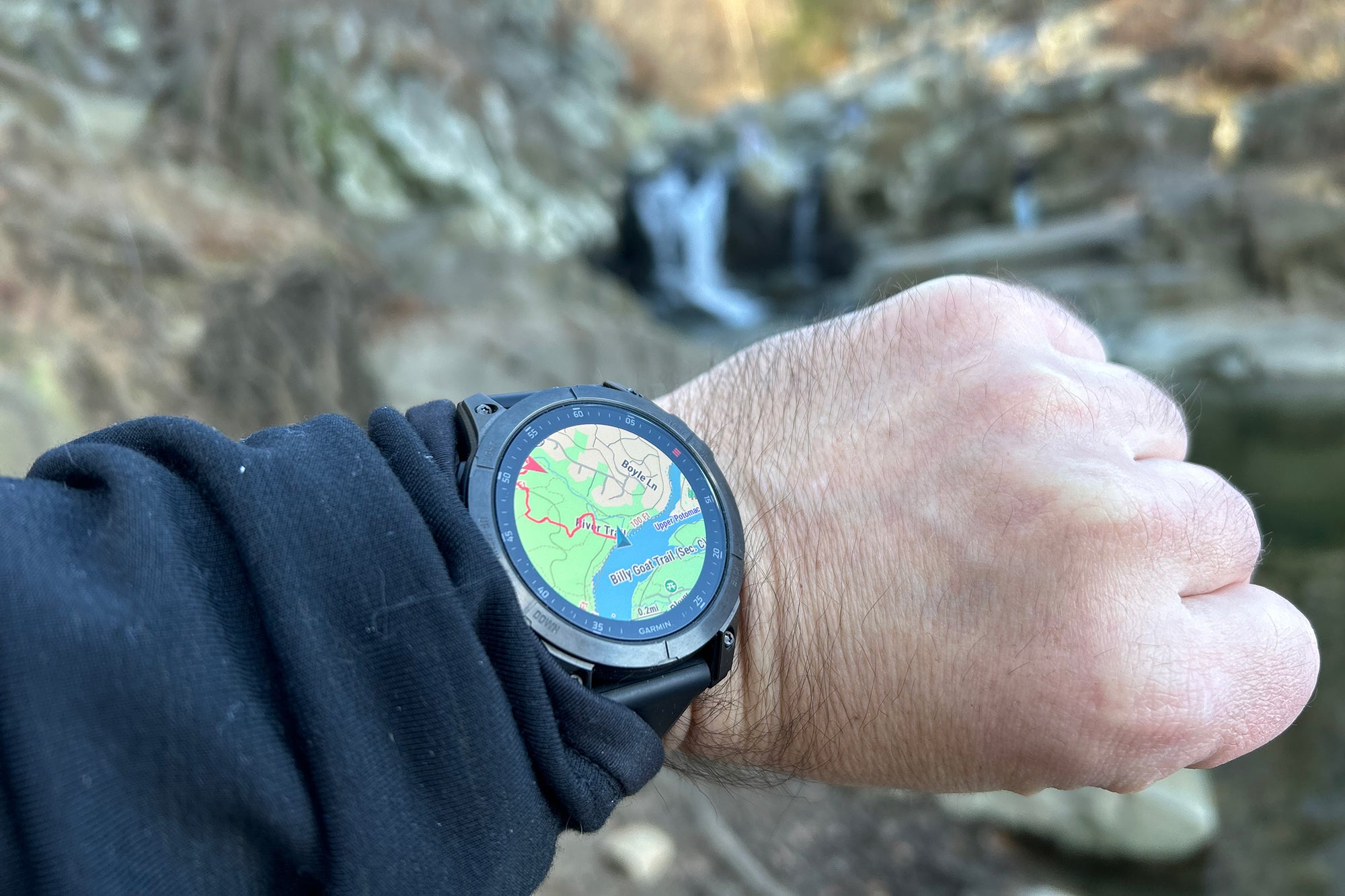
Best running watch: Forerunner 955 Solar
Abby Ferguson
Why it made the cut: The Forerunner 955 Solar offers excellent battery life with a seemingly endless list of features and capabilities, from training and safety tools to full smartwatch abilities and countless customization options.
Specs
- Display: 1.3-inch transflective memory-in-pixel (MIP)
- Touchscreen: Yes
- Battery life with GPS: Up to 42 hours/49 hours with solar (GPS only mode)
- Weight: 1.86 ounces
Pros
- Long-lasting battery life
- A plethora of sensors for lots of data
- Full smartwatch capabilities
- Touchscreen
Cons
- Solar charging doesn’t add much to battery life
If you are serious about improvising your fitness and performance, a watch with many sensors is a must. There’s no such thing as too much data for such athletes. That’s where the Forerunner 955 Solar comes in. It’s jam-packed with just about every sensor you could imagine so that you can measure everything from heart rate to stride length and even REM sleep.
Garmin then uses all that data to provide training suggestions and status updates via the watch and the Garmin Connect app. It helps prevent overtraining, offers a rough guide for improving your performance, and suggests workout ideas to keep your training fresh (as we found out in our full review). Your Forerunner 955 can even give predictions on race times for different distances. It’s essentially like having a coach right there on your wrist (or in your pocket).
Beyond fitness tracking, the watch also pairs with your phone for full smartwatch capabilities. It will give you notifications for calls, texts, and all your apps and even let you send some preformatted responses right from the watch. And you’ll have access to important safety features for runners so that they can track your progress on an activity (LiveTrack), and you can quickly request help (Assistance).
Best for hiking: Instinct 2 Solar and Instinct 2S Solar
Abby Ferguson
Why it made the cut: The Instinct 2 Solar provides truly impressive battery life and rugged design for those who seek out long adventures.
Specs
- Display: 0.79 x 0.79-inch or 0.9 x 0.9-inch monochrome, sunlight-visible, transflective memory-in-pixel (MIP)
- Touchscreen: No
- Battery life with GPS: Up to 30 hours/48 hours with solar
- Weight: 1.52 ounces or 1.86 ounces
Pros
- Ridiculous battery life
- Available in two sizes
- Robust fitness tracking and health features
- Garmin Pay compatible
Cons
- Black and white display
- Detailed maps and graphs don’t show up well
Hiking—especially long hikes and backpacking—requires more from a watch than many other activities. Battery life, in particular, is critical. Recording with GPS for long periods can eat through battery life, and having your hike recording disappear because of a dead battery is extremely frustrating. The Instinct 2 Solar attempts to solve this with its absurdly long battery life. For example, in Expedition mode, you can get up to 105 days of battery with the right solar conditions.
Part of the long battery life is thanks to the rather simple monochrome display. It’s not a fancy color touchscreen like some of the more premium Garmin watches, but it’s easily visible even in bright sunlight and fits the rugged design of the watch. Additionally, the Instinct Solar 2 comes in two case sizes: 40mm or 45mm. That’s especially ideal for those with tiny wrists who don’t want a giant watch (like me, for instance). And a newer Instinct 2X Solar has been released with a larger bezel for those who prefer a larger display and longer battery life, so now there are three size options within the family.
The watch comes with more basic sensors, including heart rate, barometric altimeter, accelerometer, thermometer, pulse ox monitor, compass, and a few GPS modes. Even though it doesn’t have as many sensors as the more expensive watches, it still provides training details, statuses, and suggestions to improve your fitness without thinking much about it.
Best for diving: Garmin Descent G1 Solar
Abby Ferguson
Why it made the cut: The solar capabilities of the Descent G1 Solar prolong the battery life, allowing you to stay out longer while recording your dives. Plus, it offers a full suite of freediver-friendly features to keep you safe and help you improve your apnea performance.
Specs
- Display: 0.9 x 0.9-inch monochrome, sunlight-visible, transflective memory-in-pixel (MIP)
- Touchscreen: No
- Battery life with GPS: Up to 26 hours/39 hours with solar
- Weight: 2.32 ounes
Pros
- Excellent battery life and fast charging
- Dive features are intuitive and easy to use
- Very customizable
- Pairs with other Garmin fitness devices like heart rate monitors and power meters
Cons
- Monochrome screen
- Not as sleek as the more premium Garmin dive watch
While most forms of exercise overlap with what you would want from a watch, diving presents a unique situation. Environmental conditions such as tide and weather are even more critical when diving, and different data types are useful to stay safe. The Garmin Descent G1 Solar is a robust and rugged dive computer and exercise watch that is water-rated to 100 meters. It’s the ideal tool for those who dive but don’t want a separate device for exercise on land.
This watch can keep you updated on the current tide, surf, and weather conditions, provides GPS coordinates of your surface entry and exit points, and can pair with the Garmin InReach communication device. All these features will help keep you safe even if you are in a remote location. Plus, you’ll get up to 25 hours of battery life in dive mode, so you won’t have to worry about your watch dying mid-dive session.
The Descent G1 Solar comes loaded with multiple types of diving, including single and multiple gas dives (including nitrox and trimix), gauge, apnea, apnea hunt, and closed-circuit rebreather. But it’s also ready for just about any other type of activity, from running to cycling and even hunting and yoga. My husband has been using this watch for six months and said it is a fantastic partner to have with you in the field (or in the water) on long days.
Best fashion wearable: Garmin Venu 2
Amazon
Specs
- Display: 1.3-inch AMOLED optional always-on mode
- Touchscreen: No
- Battery life with GPS: Up to 22 hours (GPS without music); 11 days as just a smartwatch
- Weight: 1.73 ounces
Sometimes you want a smartwatch that is less focused on your workouts but can keep you up on work while you’re out. While keeping track of your steps, etc., is valuable, sometimes you want to control your watch and control your life. The Garmin Connect app allows the company’s watches to sync to iOS and Android phones via a robust Bluetooth connection. This opens up advanced wellness features and biometric tracking, as well as a way to further customize the watch’s features. But what I really love is how syncing the two lets me subtly check my messages and calendar alerts by simply glancing at my wrist. I can also control my music, navigate through a new city, and many other things I’d normally use my phone for—all while keeping my hands free. Now, reaching into my back pocket for anything other than answering a call seems like a waste, even when not working out.
The Venu 2 features a colorful, touch-sensitive AMOLED display that’s as easy to read as it is to navigate. This is great because the smartwatch is loaded with features, including activity tracking, a powerful GPS, onboard storage for up to 650 songs, and seamless integration with your smartphone via the Garmin Connect app. This is a watch you can wear all day, in any setting, and it’ll never look out of place (and you can read more about the experience in our full review).
Best budget watch for beginners: Garmin Vivoactive 4
Garmin
Specs
- Display: 1.3-inch sunlight-visible, transflective memory-in-pixel (MIP)
- Touchscreen: No
- Battery life with GPS: Up to 18 hours (GPS without music)
- Weight: 1.78 ounces
Pay attention to your budget when choosing a smartwatch. If you don’t need advanced features, like solar power, and AMOLED screens, then don’t pay extra for them. If you’re looking for a basic fitness tracker and something that syncs with your phone, many of Garmin’s entry-level watches will suit you just fine.
They still offer basic sports apps, GPS, and access to apps and widgets from the Garmin Connect store, and they’ll integrate with iOS and Android phones. While future-proofing yourself might seem smart, smartwatch technology develops quickly and by the time you’re ready for more advanced features, watches featuring them might drop in price. Only pay for what you’ll use.
Garmin’s Vivoactive 3 GPS smartwatch features built-in sports apps, a contactless payment system, and the ability to sync with compatible smartphones. It comes housed in a classy package that looks great in the gym and out and about, and the watch face can be personalized by visiting Garmin’s Connect IQ store.
What to consider when choosing a Garmin smartwatch
After holding the pandemic at bay with packaged cookies and streaming TV, people have been reintroducing regular exercise and movement into their lives in living rooms, gyms, trails, and beyond. And achieving goals is easier if you can accurately track them. However, if you’re not a hardcore athlete, you don’t need the same features someone training to hit specific benchmarks would. When choosing the best Garmin watch, focus on finding the health monitoring features you want without paying extra money for those you’ll never use. Here are some things to think about when choosing the best Garmin activity tracker:
Features
Are you looking for a simple workout tracker, or do you need advanced metrics? Will it be closely monitoring your health? How important is the sleep tracker function? Do you prefer a fitness watch that allows you to organize your life by providing access to your phone’s messages and calendars? Will you pay for things by tapping your watch? Download and play music, or control the music player on your phone? How important are GPS features? Different watches offer different combinations of these features and more. There’s a big difference between something like the $199 Garmin Forerunner 55 (reviewed here) or the $169 Garmin Forerunner 35, which are dedicated Garmin running watches, and something like the $399 Garmin Venu 2, which is more of a well-rounded smartwatch you’ll wear all the time.
Style
Many of Garmin’s best sports watches aren’t exactly elegant to look at. Think about when and where you plan on wearing your watch. Do you like the bulky aesthetic of classic sports watches, like the Garmin Instinct Solar, or do you want a watch you can wear all day—maybe even going straight to work from the gym? Don’t forget to look at the different color options available to each watch model, and keep in mind that watch bands are often customizable.
Battery life
Do you spend a lot of time camping? Do you go weeks without seeing an outlet? Or are you home each night with access to a charging station? Make sure the watch you purchase won’t let you down by running out of juice. This doesn’t necessarily mean larger batteries—Garmin makes solar versions of most watch series that can last for weeks if exposed to enough direct sunlight. For other watches, battery life can come down to usage. The Venu 2, for instance, can last up to 11 days in battery-saver mode, but it will die in just 7 hours if you’re playing music and using GPS.
FAQs
Q: Is Garmin better than Apple Watch?
Everyone’s definition of “better” will differ. In the end, choosing the best smartwatch comes down to the features you want, your budget, and whether you’re already part of the Apple ecosystem. While Apple far and away controls the largest market share for smartwatches, Garmin has a solid chunk by offering a variety of GPS and sports watches geared toward different users’ needs. There is undoubtedly no easier experience than pairing an Apple Watch with an iPhone for seamless connectivity and maximum productivity. And the Apple Watch Ultra has ratcheted up the brand’s durability for endurance athletes. But if you’re looking for a serious training tool, however, something like the Garmin epix (Gen. 2) could offer some handy training features that the Apple Watch can’t.
Q: What is the best value Garmin watch?
Again, it comes down to what you want your watch to do and how much you can afford to spend. The Venu SQ 2 starts at just $249. While it lacks some of the high-end bells and whistles found on the $399 Venu 2, the Venu SQ 2 still offers an impressive set of features for the price, including a blood oxygen monitor and sleep tracking. If you don’t need full smartwatch capabilities and you specifically want to track your runs, then Forerunner 45 is only $150 and gets you tons of fitness tracking muscle without the stuff you may not use.
If you want a full feature set without such a bulky frame, the Garmin Vivoactive 4S is a solid balance of value and performance. At $349, it’s cheaper than the flagship models but more expensive than the entry-level offerings.
Q: Are Garmin watches worth it?
If you’re looking for a convenient way to track your activities and monitor your health, and you like the idea of a more subtle way to control your phone and receive messages and alerts, then I absolutely think Garmin watches are worth it. The best Garmin smartwatches offer top-tier tools for training and fitness, sleep trackers are the like, and the Garmin Connect app for iOS and Android opens up a host of features that push the watch in powerful directions. If you’re already in the Apple ecosystem, an Apple watch is definitely worth investigating; Apple products have a way of seamlessly integrating that makes them a delight to use. However, even if you’ve got an iPhone, and especially if you’re using an Android phone, Garmins are strong contenders in the smartwatch field.
Final thoughts on the best Garmin smartwatches
- Best overall: Garmin fēnix 7 Sapphire Solar and Garmin epix (Gen. 2)
- Best running watch: Garmin Forerunner 955 Solar
- Best for hiking: Garmin Instinct Solar 2
- Best for diving: Garmin Descent G1 Solar
- Best fashion wearable: Garmin Venu 2
- Best budget watch for beginners: Garmin Vivoactive 4
It’s no mystery why Garmin has become a top smartwatch company. Instead of taking a one-size-fits-all approach to watch design, Garmin has offered up options focusing on health and fitness, all-day wear, and high-tech gadgetry designed to fit individual users’ lifestyles. Sometimes the differences aren’t obvious, and shopping for a Garmin watch can feel daunting. But by identifying your needs first and consulting this guide, you’ll be able to zero in on the smartwatch that’s best for you.
Why trust us
Popular Science started writing about technology more than 150 years ago. There was no such thing as “gadget writing” when we published our first issue in 1872, but if there was, our mission to demystify the world of innovation for everyday readers means we would have been all over it. Here in the present, PopSci is fully committed to helping readers navigate the increasingly intimidating array of devices on the market right now.
Our writers and editors have combined decades of experience covering and reviewing consumer electronics. We each have our own obsessive specialties—from high-end audio to video games to cameras and beyond—but when we’re reviewing devices outside of our immediate wheelhouses, we do our best to seek out trustworthy voices and opinions to help guide people to the very best recommendations. We know we don’t know everything, but we’re excited to live through the analysis paralysis that internet shopping can spur so readers don’t have to.
